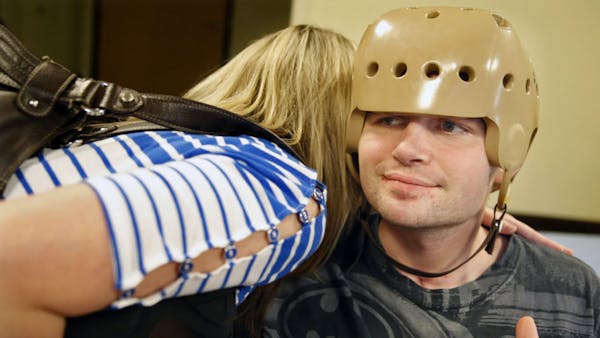Ray Widstrand walked into a Ramsey County courtroom Friday morning with a walking stick in his left hand and a large scar running across the right side of his shaved head.
It was Day 3 in the trial of a teen accused of attacking Widstrand in a group ambush last August, and the 27-year-old St. Paul man wanted a front-row seat to catch testimony about an assault that nearly killed him and left him struggling with mental and physical disabilities.
But Widstrand's presence was anything but routine.
It set off a vociferous battle between attorneys over whether he should be allowed to be there at all, an issue that Ramsey County District Judge Joanne Smith won't decide until next week.
Smith said Friday that there was little precedent about how to handle such an issue and cautioned attorneys on both sides that her final decision would serve as a "first impression" for the state of Minnesota about the delicate balance between victims' rights and a defendant's right to a fair trial.
Smith said that she will hear more arguments on the matter Monday before deciding whether Widstrand can attend any more of the trial of Cindarion D. Butler, 17.
Butler and four teens were initially charged with attacking Widstrand on St. Paul's East Side about 11:30 p.m. on Aug. 4 after a group of 50 to 70 teens watched girls fight in the street. Widstrand, who was walking through the crowd, suffered a traumatic brain injury.
Although a witness has placed Butler at the scene that night and said Butler pulled down Widstrand's shorts, Butler's attorney maintains that his client never touched Widstrand.
Friday morning's courtroom drama started after Widstrand arrived while jurors were on a break. His appearance sparked a heated exchange between Assistant Ramsey County Attorney David Miller and Butler's attorney, Christopher Zipko, and led to immediate discussion with Smith.
"I have a dramatic concern" with it, Zipko told the court after Widstrand was escorted out. "I think it's inflammatory."
With jurors still out of the courtroom, Zipko said he would subpoena Widstrand as a rebuttal witness, effectively banning him from watching the trial since witnesses are sequestered.
Miller told the court that the prosecution did not ask Widstrand to attend. He called Zipko's plan "poor practice" and "maybe unethical."
"Well, I'm shocked, to tell you the truth, that this is being used as a tactic to exclude him," the judge said of the possible subpoena. "I'm hard-pressed to know how the court could exclude someone from a public courtroom."
Smith pressed Zipko to explain what he would ask of Widstrand on the witness stand. Zipko said he would question Widstrand about what he saw the night of the attack.
Miller countered by noting that it's unclear if Widstrand has any memory of the ambush.
The judge and the attorneys later used their lunch hour to research the issue of whether a victim can attend a trial that involves him or her and whether the defense can subpoena the victim the way Zipko proposed.
But Smith said later that there was little guidance in case law or statutes on how to resolve the matter.
Sequestration has been used in Minnesota to exclude a victim from attending trial. Although it has not been found to be improper, it could conflict with Minnesota's victims' rights statute, Smith said.
On the other hand, the judge said, defendants are entitled to a fair trial.
"It behooves us to be very careful," Smith said.
Widstrand did not attend the rest of testimony Friday. He has, however, indicated that he wants to attend the last day of testimony Monday, Miller said.
In addition to Butler, one juvenile has pleaded guilty in the August attack. Another juvenile charged awaits a court hearing, while the case against a third juvenile was dismissed. Issac O. Maiden was acquitted in a November trial.
Chao Xiong • 612-270-4708
Twitter: @ChaoStrib

A tale of 124 hoarded Minnesota cats has at least a hundred happy endings

Walz, St. Paul leaders urge support for copper wire theft bill: 'We've got to get in front of it'
Body of missing canoeist, 15, recovered from southwest Minnesota lake

High winds flipped a FedEx truck traveling on Bong Bridge in Duluth

